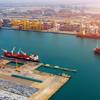Following a previous successful pilot, GoodFuels Marine has also won Port of Amsterdam’s tender for its fleet of five patrol vessels. The vessels will now run on fuel containing 30% exceptionally high-quality biodiesel. This will reduce CO2 emissions by 25% compared to fossil diesel.
Marleen van de Kerkhof, Port of Amsterdam Harbour Master: ‘Clean shipping is a key spearhead of our sustainability strategy. Part of this strategy entails making our own patrol vessels more sustainable. Using marine biofuels enables us to reduce our own CO2 by 25%, which is a good step in the right direction.’
Dirk Kronemeijer, CEO of GoodFuels Marine: ‘Port of Amsterdam and Port of Rotterdam have actively supported the development of marine biofuels from the beginning. This is why we are especially pleased that, after a successful pilot, Port of Amsterdam will be able to reduce the CO2 emissions of its own patrol vessels by 25%. We are in turn committed to further invest in the Port in the field of the storage, production and distribution of sustainable marine biofuels in order to accelerate the development towards clean and low-carbon shipping.’
Tjerk Wagenaar, Director of Natuur & Milieu: ‘Port of Amsterdam is taking a great step forward in making its operations more sustainable through this measure. The transition to sustainable advanced biofuels is an excellent example of how shipping can reduce its CO2 emissions.’
GoodFuels’ renewable ‘drop-in’ biofuel is a sustainable and high-quality alternative to fossil diesel. The blend used by Port of Amsterdam contains 30% advanced second-generation biofuels and complies to the EN590 norm.
This means it can be used directly in all diesel engines without any modifications to the engine and the factory warranty remains valid. The sustainable biodiesel is produced from certified waste flows that cannot be used in other industries or for other purposes. This promotes the circular economy.












